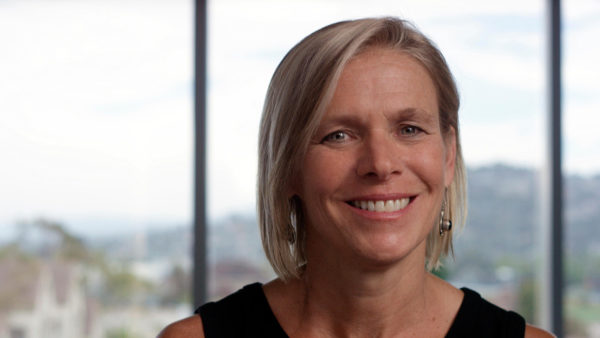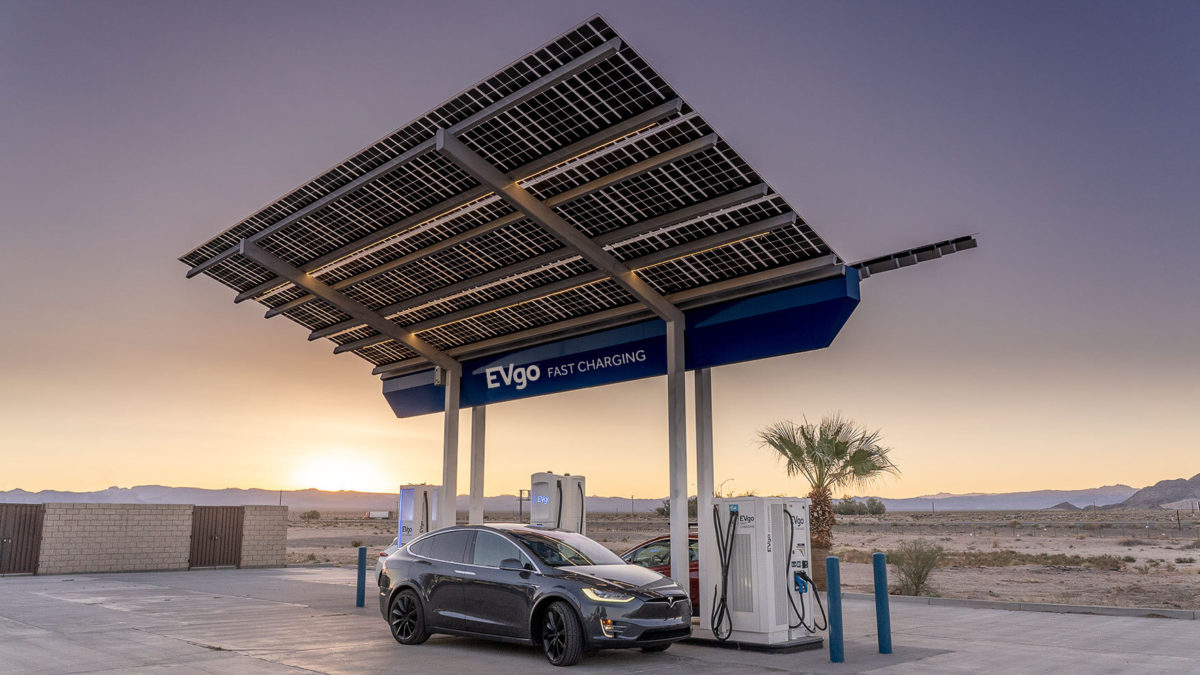As CEO of America’s largest fast-charging network for electric cars, Cathy Zoi has a broad view of green transportation
I’ve known Cathy for a long time. We’d been out of touch for more than a year and we thought a drink was in order. For much of her career, Cathy has been at the epicenter of the world of global climate policy and finance. She was Assistant Secretary for Energy Efficiency, Renewable Energy, and Entrepreneurship in the Obama administration from 2009 to 2011. Following that, she became a partner at Silver Lake Kraftwerk, backed by Soros Fund Management and Silicon Valley private equity giant Silver Lake Partners.

Unfortunately, time zones scotched our hope for a relaxing COVID-19 ZOOM drink. Cathy’s workday in Santa Monica ends at about the time I have the day’s first coffee in Australia. Still, we had a lot to catch up on. Zoi became CEO of EVgo in 2017 when the US economy was in overdrive, and interest in electric vehicles was surging. As the industry leader in fast-charging stations for electric cars, EVgo was poised to become one of the brightest examples of success in the new climate economy.
“It’s a different approach to traditional gas stations and there are huge opportunities.”
Two years into a job she loves, Zoi now faces a sobering challenge. By the end of March, EVgo’s record growth had been blunted by the pandemic. The global lockdown has precluded much driving. According to British market analysts Wood Mackenzie, overall electric vehicle sales are expected to decline 43% this year to 1.3 million. Zoi admits that at the moment, EVgo’s business is down 60%.
“We are all okay. Really”
Most chief executives at a capital intensive startup would be rattled. Not Cathy Zoi, whose career as a proponent of sustainable development prepared her for big road bumps. “We are all okay, really,” says Zoi. And her optimism is not so blind. EVgo has been designated an ‘essential service,’ during the COVID-19 pandemic — which in itself is a big vote of confidence in the future of electric vehicles. The company is moving ahead with its nationwide buildout of charging stations.
It also helps that the clean power-focused private equity group LS Power Group purchased a majority stake of EVgo in December, relieving the burden of contingency financing from Boulder-based sustainable investment firm Vision Ridge Partners. Until LS Power Group stepped in, EVgo was the legacy of the 2001 settlement between the State of California and a former Dynegy Inc. subsidiary over Dynegy’s alleged price-fixing, and its role in precipitating the state’s 2001 electric power crisis. During the lawsuit, Dynergy sold its California power subsidiary to NRG Energy, Inc. As part of the settlement with the state of Califonia, NRG Energy agreed to pay $100 million to establish a state-wide EV fast-charging network. NRG Energy, Inc. sold EVgo to Vision Ridge Partners in 2016.
Evolving from a state mandate to a profitable business has not been easy. EVgo is not yet profitable given the cost of deploying and maintaining the electric chargers. And the COVID-19 pandemic has greatly complicated future growth plans. Zoi must now balance a short term drop in customer demand by building expensive new fast chargers. The company now has more than 800 charge locations in 66 markets with dozens more under construction. “More than 100 million people now live within 15 minutes of an EVgo charger,” she says.
The cost of renewable energy was $1,200 per kWh, now it’s $100-150 per kWh. That’s a huge decline. EV costs are declining significantly too.
But how many of these 100 million people will switch to electric cars? EVgo bets that fast-charging charging stations will ease the transition. Zoi believes driving an electric vehicle is simply a better experience for both consumers and the climate. The availability of fast-chargers is crucial for long-distance drivers. Chargers are now popping up wherever drivers shop, work or play. Plugin and an EVgo charger can get your battery 80 percent charged in about 30 minutes, or about the time it takes to go food shopping or have a coffee with a friend. Says Zoi: “It’s a different approach to traditional gas stations and there are huge opportunities.”
“We’re building as fast as we can”
Regardless of the pandemic, Cathy believes three elements will continue to support the growth of the EV industry: “First, the costs of the vehicles have to come down along with charging times. When I worked at the Department of Energy, the cost of renewable energy was $1,200 per kWh, now it’s $100-150 per kWh. That’s a huge decline. EV costs are declining significantly too. Secondly, the distances EVs can travel per charge have to go up and they are. Most EVs can go 200 to 300 miles per charge now depending on the model. Finally, people have to know they can charge everywhere. That’s what EVgo is focusing on — ensuring we have charging stations that are convenient in locations away from home, in apartment and office parking lots, where people shop. We’re building as fast as we can and that hasn’t stopped.”
There remains the danger that auto companies will lose enough money in the post-COVID-19 economy to derail their ambitious plans to spend over $300 billion over the next decade on a wide range of ever more affordable electric vehicles. Even that doesn’t daunt Zoi’s optimism. “That’s a ton of money,” says. “It’s starting to happen.” The good news is that much of the early development of new vehicles is already funded and in motion. Some industry analysts predict that with new models by Volvo, Nissan, GM, BMW, among others, there are likely to be 150 EV car models to choose from in 2023. That’s three years away.
Zoi herself drives a Tesla Model 3. “It’s the best car I’ve ever driven.” Tesla cars have opened people’s minds to the idea that EVs can be great cars, sporty even, fun to drive, trendy.”
“Trendy” won’t sell EVs. Affordability and reliability require a big investment. EVgo is seeking partnerships with car companies like Tesla and Nissan and also with rideshare companies, gas station chains like Chevron, and food companies like Whole Foods Market. To attract buyers, EVgo has entered into inducement offers such as offering new Nissan Leaf Plus drivers $250 in prepaid charging. Most of the company’s 180,000 customers are also subscribers to a monthly charging plan. Last year, Uber announced a $10 million sustainable mobility fund to boost EV adoption among drivers and partners.
Championing alternative energy
Taking the helm of EVgo two and half years ago was a logical progression for Zoi, who has spent her entire career championing alternative energy both in and out of government, including a stint developing micro-grids up in sub-Saharan Africa. “It’s perfect for me because it’s an area that is moving fast and we have to be innovating all the time. The tech is still evolving, and we are evolving too to make charging faster and more convenient.”
Zoi herself is part of an evolution — not simply a woman in a male-dominated, corner-office culture, she is a CEO who is as concerned about the purpose and mission of the company as with its growth. “I enjoy how EV charging fits into climate and energy policy. It’s an area where we could see huge growth in jobs and with oil prices dropping below the floor and coal funding drying up. I think we’ve hit peak fossil. The CEOs of Shell, BP, and Total are more or less admitting their core product, oil, is on the outs.”
We need to be open to what’s going to work.
Zoi believes global climate awareness has reached a tipping point that will accelerate the transition to a climate-friendly economy. “I think things are moving faster because people get climate change now more than they ever did before. There’s more willingness to look at new solutions and more and more people want to invest in them. There’s also a new pragmatism in business to look at all of the options because we have to. We need to be open to what’s going to work.”
Key to this green future will be collaborating with governments that understand the need to support renewable infrastructure projects. “If you compare California — where half of our charging stations are — to the rest of the US, it’s really clear that having a government that is open to change early and willing to set a policy to support innovation makes a real difference. The more governments can collaborate to share information about what works, the better,” she said.
Managing through a pandemic
For the moment, Zoi needs to manage through a pandemic. In addition to tweaking growth strategies, EVgo has been looking to support those affected by the pandemic. The company has offered a 30 percent discount for essential workers in healthcare, food delivery, foster care, and rideshares especially for anyone experiencing hardship because of the virus. More than 1,000 drivers have signed on. “We’re helping where we can,” she says.
She is also using the time to plot the company’s post-pandemic course. “Time at home certainly has given me and those inside EVgo time to think about what happens from here,” she says. “Electrification with efficiency and storage can accelerate the change we need to move from emissions-intensive energy. EVs and batteries can be a big part of that.”
We wind up with a ‘what’s next on the agenda?’ discussion. For Cathy, it’s a good bottle of Italian white and a meal cooked up and dropped off by a chef neighbor who has time on his hands. For me sadly just a coffee but I’m looking forward to a catchup ride with Cathy in her Tesla Model 3 if we are ever able to travel again.


